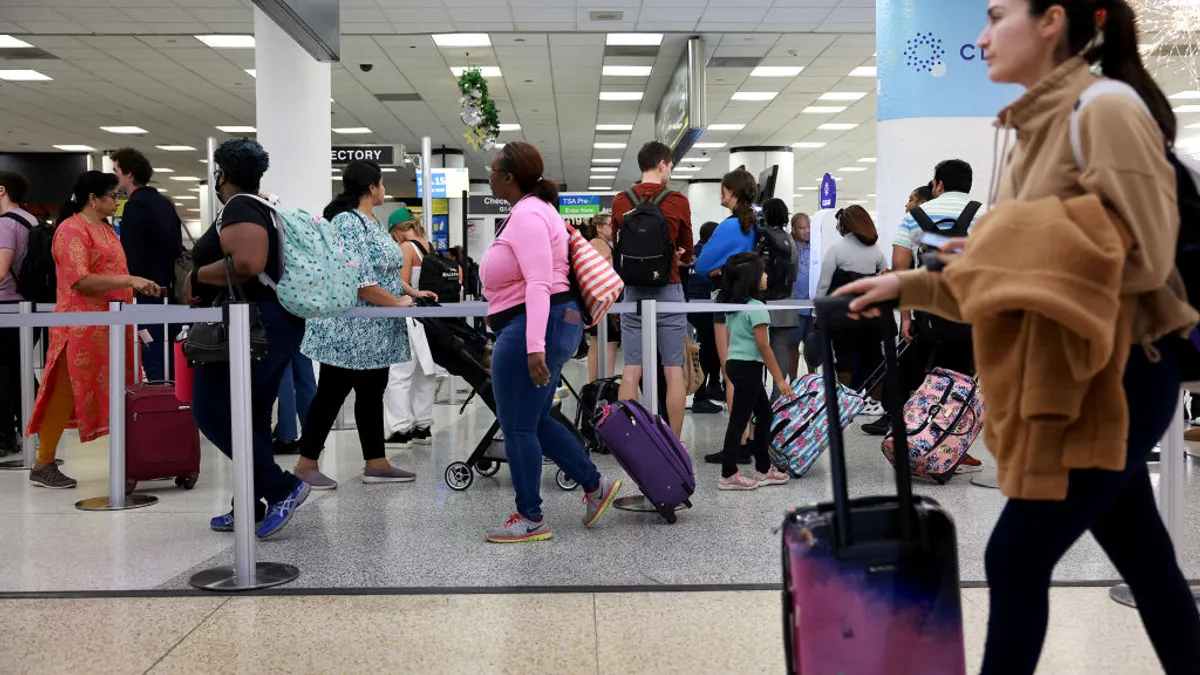When Eileen Scott first heard of a proposal to eliminate taxes on tips, her first thought was, “That’s the greatest idea.”
Scott, a cocktail server at Harrah’s Las Vegas, said tips are an important part of her income, and some days, they’re great. But employment as a tipped worker is complicated, she told Hotel Dive. Customers’ tipping habits fluctuate wildly — and her actual tips are often much smaller than her tippers think.
“When the guests give [a tip] to you, they give it to you because you took care of them. They give it to you as a gift,” she said. They don’t think about how those tips end up split between the bartender, barback and Uncle Sam, she said.
Scott is among a cohort of the hospitality industry — including hotel employees, hotel associations and hotel worker unions — who support the elimination of federal taxes on tipped wages.
And that elimination could soon be a reality, as the President Donald Trump-backed taxation and spending reconciliation package — dubbed the One Big Beautiful Bill Act — heads to the Senate after House approval in May.
The version passed in the House lays out budgetary priorities including tax cuts, reduced spending on services like Medicaid and additional funding to Trump campaign-promised priorities such as border security. It also contains a provision that would eliminate federal taxes on tips. The arrival of the bill in the Senate follows the body's May 20 passage of Republican Sen. Ted Cruz's No Tax on Tips Act, which outlines similar legislation.
But while hotel industry associations and hospitality worker unions support the elimination of taxes on tips, what the legislation will look like — and its potential effects — are still up for debate.
A popular idea
The American Hotel & Lodging Association is one industry voice advocating for the elimination of federal taxes on tips.
“There are a lot of job categories within the hotel industry that benefit from tips — 800,000 individuals, when you add it all up,” AHLA President and CEO Rosanna Maietta told Hotel Dive. “That is significant, and for them to be able to take home more pay that they earn every day matters.”
In the run-up to the 2024 presidential election, both Trump and former Vice President Kamala Harris pledged to eliminate taxes on tips. In January, following Trump’s inauguration, Maietta joined the president onstage at a rally in Las Vegas, where she called a no taxes on tips proposal “a crucial step” toward helping tipped workers “keep more of their earned income in their pocket.”
“We're particularly interested in ensuring that the rule applies to all the job categories in the hotel industry that benefit from tips, and not just those traditional ones that are in restaurants."

Rosanna Maietta
President and CEO of the American Hotel & Lodging Association
“I think there’s broad support by both Democrats and Republicans, because we are in an environment where tipping is common practice,” Maietta told Hotel Dive. According to a Newsweek poll conducted in July of last year, some 67% of Americans did not believe tips given to service workers should be taxed.
More recently, that support has resulted in legislative moves, with the AHLA-backed No Tax on Tips Act passing the Senate on May 23. The act, which Republican Rep. Byron Donalds of Florida introduced in the House in July and Cruz reintroduced in the Senate in January, includes an above-the-line deduction of up to $25,000 for federal taxes on tips.
“This bipartisan legislation will put more money in the pockets of the hundreds of thousands of hotel workers who receive tips, ranging from housekeepers and valets to food service professionals and bellhops,” Maietta said in a statement upon the Senate’s passing of the act.
Meanwhile, other legislation to eliminate taxes on tips is still at play. The provision in Trump’s reconciliation package is similar to Cruz’s act in that it requires the Treasury to determine which professions will be eligible under the law.
“The goal is to set some guardrails,” Maietta said of Cruz’s bill. “We're particularly interested in ensuring that the rule applies to all the job categories in the hotel industry that benefit from tips, and not just those traditional ones that are in restaurants.”
However, the reconciliation package provision differs from the No Tax on Tips Act in that it does not have a cap on the deduction. It also has a limited timespan.
“It is temporary,” said Anne Bushman, a partner in RSM’s Washington national tax practice, about the reconciliation package’s taxes on tips provision. “It's retroactive to January 1, 2025, and then set to expire December 31, 2028.”
Experts told Hotel Dive that Senators could change the reconciliation package’s wording on taxed tips in coming weeks, but that the Senate’s approval of Cruz’s act means it’s likely the provision will remain in the package.
“I think the vote in the Senate was sort of a messaging vote, and the more likely vehicle for [no taxes on tips] becoming law is in the reconciliation package,” Alex Muresianu, a senior policy analyst at the Tax Foundation, told Hotel Dive.
Republicans have said they aim to get the bill through the Senate and to Trump’s desk by July 4, according to The Washington Post.
Differing approaches
Although both Democrats and Republicans have expressed support for the elimination of taxes on tips, critics remain.
Democratic Rep. Steven Horsford of Nevada, for instance, introduced his own bill, the Tipped Income Protection and Support Act, last year, which would not only eliminate taxes on tips but also eliminate subminimum wages for tipped workers.
“A good chunk of tipped workers work part-time, and make less than the standard deduction, so they already don’t pay federal income tax, period, on their total income, tipped or otherwise.”

Alex Muresianu
senior policy analyst at the Tax Foundation
Culinary Workers Union Local 226 and Bartenders Union Local 165 — Nevada affiliates of national hospitality union Unite Here known collectively as the Culinary Union — backed Horsford’s act. The union’s secretary treasurer, Ted Pappageorge, has said that a rule to eliminate taxes on tips “must not end there,” and should also eliminate the $2.13 subminimum wage many servers are paid.
Horsford’s act was referred to the House Committee on Ways and Means in February but has not advanced since.
According to Muresianu, the current bills being considered may not help workers at the lowest income brackets.
“The lowest income of tipped workers would not actually stand to benefit [from no taxes on tips legislation] very much at all,” he noted. “A good chunk of tipped workers work part-time, and already make less than the standard deduction, so they already don't pay federal income tax, period, on their total income, tipped or otherwise.”
Last summer, the Committee for a Responsible Federal Budget estimated that exempting all tip income from federal income and payroll taxes would reduce federal revenues by $150 to $250 billion over 10 years, “and could reduce revenue significantly more once behavioral effects are incorporated,” such as employees reclassifying ordinary income as tip income whenever possible, to maximize their tax advantages.
“The magnitude of that behavioral effect is uncertain and would depend significantly on the regulatory guardrails that accompany the policy,” per the committee.
However, the potential regulations currently in Congress seem to address some critics’ concerns.
“It does seem like [legislators] are aware that there may be the potential for abuse,” said Bushman. “I say that because both [Cruz’s act and the reconciliation package] specify it needs to be a business that customarily would have received tips.”
“The devil's in the details of the legislation,” Maietta told Hotel Dive, adding that AHLA worked closely with Sen. Cruz’s office for that reason.
“How do you ensure that those job categories aren’t, say, managers who aren't in tipped positions?” she added. “It really does matter how you write the rules around this.”
If new legislation on taxed tips does get passed, Bushman added, some businesses may need to scramble to adjust.
“I do think it will be a crunch for employers and for payroll companies,” she said. “It sounds simple to just say, ‘Oh, you put tips on the W-2 and then they get this deduction.’ But everything is now electronic and run through software, and there's going to be nuances.”
The changing tip economy
The debate over eliminating taxes on tips comes amid widespread changes in both tipping culture and hospitality labor.
For one, fewer hotel and resort guests tip in cash. “People do not carry cash, and I’m one of them,” Scott, the Harrah’s cocktail waitress, said. “I can just pay with my card, and that's the way it's going now.”
Scott also said added fees have pinched guests’ appetite for tipping.
“You can’t rely on guests to take care of you, because they really believe, ‘Why should we take care of you? We’re already paying the hotel fee. We’re already paying the resort fee,’” she said. “The hotel has taken so much from the guests that they feel like they're robbed, so we’re the ones that get left because of it.”
Though tipping is increasing across industries, some 60% of respondents to a Popmenu survey of U.S. consumers said they are tired of tipping at different establishments, according to Restaurant Dive reporting from November 2024.
Digital tipping solutions have made it easier for hotel guests to tip without cash, former Wyndham Hotels & Resorts Chief Information Officer Scott Strickland told Hotel Dive in 2023. Marriott International and IHG Hotels & Resorts have also approved numerous digital tipping providers for use at their hotels.
However, while full-service restaurant wages grew steadily after the pandemic, tips have made up a smaller portion of these wages, according to ADP Research.
Hotels, meanwhile, are paying higher wages than ever while still struggling to fill roles, according to AHLA research.
When asked whether eliminating taxes on tips could make recruitment easier for hospitality employers, Maietta said, “I do believe strongly that we offer good wages across the country.”
“Could this [no taxes on tips legislation] be an added benefit? Probably,” she added. “Is that the reason that keeps someone staying in the hotel industry? Hard to say.”
Meanwhile, AHLA has applauded the House’s passage of the reconciliation package, which also contains other tax provisions the association believes will benefit hotels, such as a provision to make the Small Business Deduction permanent and an increase in the Qualified Business Income deduction.
“We urge the U.S. Senate to swiftly pass this legislation and send it to President Trump’s desk,” Maietta said in a statement.


















